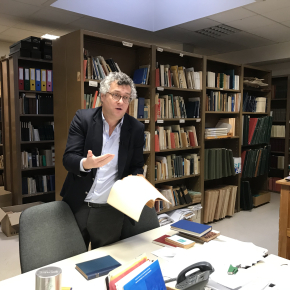The Michel Dinet documentation center, hidden treasures of the French language in Lorraine
Do you know the Michel Dinet documentation center, the etymological flagship of the CNRS and the University of Lorraine in Nancy? This extraordinary place houses an incredible collection of dictionaries from the 16th to the 20th century.
The Analysis and Computer Processing of the French Language Laboratory (Atilf), a (public) research laboratory of the CNRS and the University of Lorraine, has inherited the documentary holdings of the former National Institute of the French Language (INaLF), which it has succeeded. The ATILF celebrated its 20th anniversary in 2021.
In order to create the famous Trésor de la langue française, the INaLF had gathered an extraordinary collection of dictionaries from the 16th to the 20th century. this collection has been reorganized into a documentation center located on the Lettres et sciences humaines campus, open to all: students, linguistic researchers, and the general public. These works are still used today for the work of the ATILF laboratory. The collection has since been further enriched, in particular by the long-term loan of the library of the Französisches Etymologisches Wörterbuch (FEW). This was originally the personal library of the dictionary's author, Walther von Wartburg, which was systematically collected over a period of 50 years by this linguist and later with the support of the Swiss National Science Foundation (SNSF).
A rich collection for the study of dialects
The FEW is the great etymological dictionary of French and all its dialects, of Occitan, of Franco-Provençal, of Old French and of Old Occitan, and its library, conceived as a working tool rationally adapted to the writing of the dictionary, is undoubtedly the largest collection in the world of works on the so-called Galloroman dialects.
It contains rare or unique copies, old works, but its richness is especially in having gathered in one place all the specialized bibliography in one field (the study of dialects; but it is also very rich in the history of French), and in having organized it in view of the work on the history of words. In a century of coherent work, a tool of inestimable value has been created, which ideally complements the ATILF's own collections to make it a major resource for the study of the lexicon in its history. You can find old works in Spanish and Italian dialectology, multilingual dictionaries (German, English, Dutch, Latin...), special works in etymology, grammar, synonyms, technical works (architecture, arts, astronomy, hunting...), Trévoux's dictionary (1704-1771), Calpini, and more recent titles such as Balzac's "La comédie humaine" (The Human Comedy).
